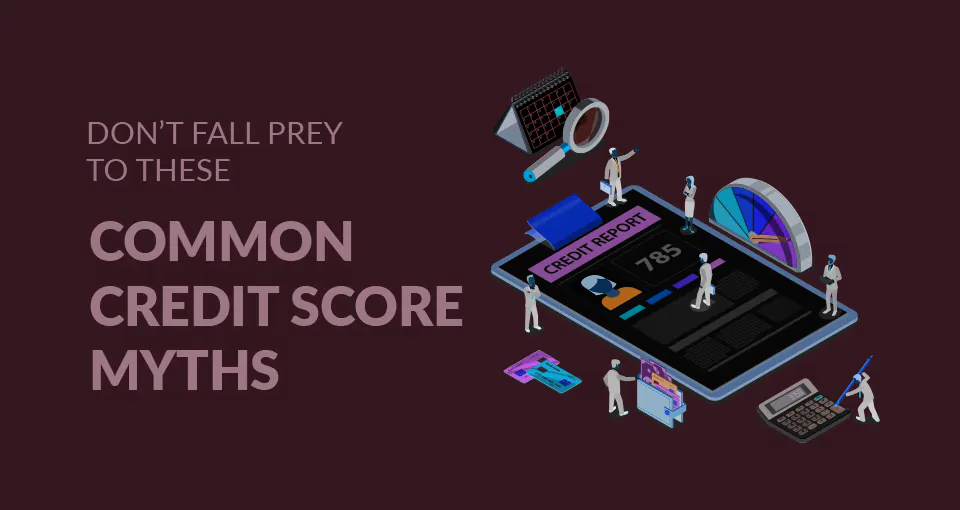Do you think that moving into a new employer will affect your credit score? And that your credit score depends on your salary? Well, it’s time to have you in for a surprise. ‘
Here are 20 myths busted about credit scores that you thought were true…
[toc]Myth 1: A bad credit score lasts forever
A bad credit score will only last forever if you continue to make choices that have already hurt your credit score. These choices include paying bills late, maxing out your credit cards, not Paying your EMIs on time,letting your bills stay pending, etc.
On the other hand, if you start managing your credit card account well, Pay All your EMIs and bills on time, your credit score will improve over time.
Myth 2: Checking your credit hurts your score
You can check your credit score as many times you want on MoneyMall without hurting your score, as long as you are using our credit scoring services, and not applying to banks/mortgage lenders to check your score. When you apply for a loan or card , lenders use something called ‘hard inquiries’, which can hurt your score if the inquiries are made repeatedly over a short period of time. However, financial companies and banks use ‘soft enquiries’ which do not hurt your credit score, no matter how many times they are made.
Myth 3: You just have one credit score
In UAE, AECB Credit Score is the only score you get. But for banks, Each person can have several credit scores because credit scores do not have a fixed way of calculation. Different credit card companies and banks use different types of scoring paradigms according to the product you apply for.
Myth 4: Higher Salary means a higher credit score
A majority of users believe that a better income will result in a better credit score. However, your income does not directly impact your credit score. Your salary will matter during loan applications and when you apply for feature credit cards. However, you must make sure that you make your payments on time and never default on a due.
Myth 5: Debit cards can build your credit score
Contrary to popular belief, debit cards neither affect your credit score nor build your credit history. Debit cards are used to make purchases digitally and electronically from the money that you already have in your bank account. The bank or financial company you use does not give you any credit for the use of a debit card. The usage of your own savings in the form of digital payments does not affect your credit score in any way.
Myth 6: Your credit score is improved by closing credit cards
If you think that closing your credit card can build your credit score, then the truth couldn’t be farther. Closing credit cards can hurt your credit score if nothing less. Moreover, it will affect the length of your credit history, reducing your credit score in the long run. Age of your credit history is an important attribute which is used by banks and financial companies before they give you a loan. The age of credit history is a characteristic that the banks refer to and it goes a long way to determine whether you will default on their credit or not.
Myth 7: The credit score you check is the same one your bank will see
A credit score that you check online on MoneyMall, It is a credit score provided and is not necessarily in the same credit score that your bank or financial company is going to use when you apply. Because your score will be calculated again when a bank checks it. While the credit score can give you a general idea on what your credit score might be, banks and other financial companies use many stringent procedures to find out what your credit score is at the time of application. So, there is a chance that your credit scores are different.
Myth 8: Getting married will merge your credit scores
You and your spouse will continue to maintain individual credit histories and credit scores even after you tie the knot. Joint accounts will affect both your scores but individual credit accounts will not be affected by them.
Myth 9: Employer check your credit scores
It is generally against the normal practice for your employee to use your credit scores before hiring you. The media routinely get this fact wrong because people do not understand that credit scores and credit reports are not the same things. Although an employer may check your credit report to see you are not overburdened in debt, they do not check your credit score.
Myth 10: Having money in the bank means you have a good credit score
Just like debit card payments in the purchase, bank account balances are not used to calculate your credit score. This is mainly because bank accounts and debit cards have nothing to do with your credit scores for your payment history. There may be a correlation between good saving habits and good credit scores, but a person can have a bad credit score and a lot of money in the bank at the same time.
Myth 11: Bad credit scores mean that you will never be approved for anything
Bad credit score usually makes it a lot harder to get approved for a loan or a new credit card, but it is not the only factor that creditors and other financial companies consider when they are evaluating your creditworthiness. Your level of debt and your monthly or annual income might also be deciding factors for credit card companies and banks before they decide to give you a loan.
Myth 12: Applying for a new credit card will hurt your credit score
The enquiry made when you apply for new credit is a factor of your credit score. Repeated hard Inquiries can hurt your credit score, but the exact effect on your credit score depends on the other important information with regard to your creditworthiness. It is possible that your credit score may not move at all after you have made an application for a renewed credit card. It is, however, highly unusual that your credit score will not decrease or increase after you have made changes to the attributes that are listed in the credit report, for example, your payment history, your age of credit, your defaults, etc.
Myth 13: Not having debt means you have a good credit score
Your level of debt is certainly a factor in the calculation of your credit score. But it is not necessary that if you do not have debt, you have a great credit score. Your credit score is vastly affected by other attributes like your payment history and whether you pay your bills and credit cards off on time.
Myth 14: You need to check credit score only if you are applying for a loan
Every consumer should check the credit scores and credit report periodically throughout the year. Monitoring your credit score and your credit reports regularly at least informs you that you are managing your credit lines well. In the event of the requirement of an emergency loan, a well-maintained credit score will pay off in ways than you can imagine.
Myth 15: A great credit score doesn’t really matter
While having a great credit score might not increase your capital and your money, it will, however, affect your ability to predict your alone from a bank or a financial institution anywhere in the world. However, after you reach a certain level, having a “perfect” score doesn’t really matter. There are no special offers for a policy that is available for people with perfect scores. As long as you are above a certain level, you will be fine.
Myth 16: I don’t need to worry about my credit score until I am older
In most countries, the minimum age at which you can apply for credit is 18 and that is when you should start worrying about your credit score. Financial experts often recommend that young people start building a Credit score as soon as possible. The length of your credit history is a big factor in your credit score, so the sooner you establish a steady credit line with a steady credit score, the better.
Myth 17: Student loans don’t affect my credit score
Your credit score isn’t just impacted by your credit card bills. You need to pay all your bills on time, which includes your student loans. You may get some subsidies or policy eligibility if you pay your loans via credit card. However, this opens you up to further exposure in case you are unable to pay off both your loan and your credit card on time.
Myth 18: Credit repair agents/consultant can fix your score
You might come across several credit repair agencies or consultant when you are looking for measures to fix your credit score. Based on your name, some people may mistake Such agencies for firms that repair your score and build it up to a good score overnight by taking a large fee. However, a credit repair agency is used to file disputes with a credit rating agency if you find errors on your credit report. If you do not have the time or knowledge as to how you can fix the errors, a credit repair agency can help you by doing the needful on your behalf, by taking a nominal fee from you.
Myth 19: Credit report contains your credit score
Even though this fact might be true for some credit agencies and financial companies, your credit report will not contain your credit score. Until you request for your Credit Report with Score. As this credit report is a required document by your employer or your insurance broker, this does not contain sensitive and protected information like your credit score for everyone to see.
Myth 20: I never took a loan or card, So, my Credit score has to be good.
No, If you don’t have any repayment history in UAE, it means that you will not have a Credit Score in UAE.
Original Post Date : May 19, 2020 , Updated on : Aug 26, 2020

